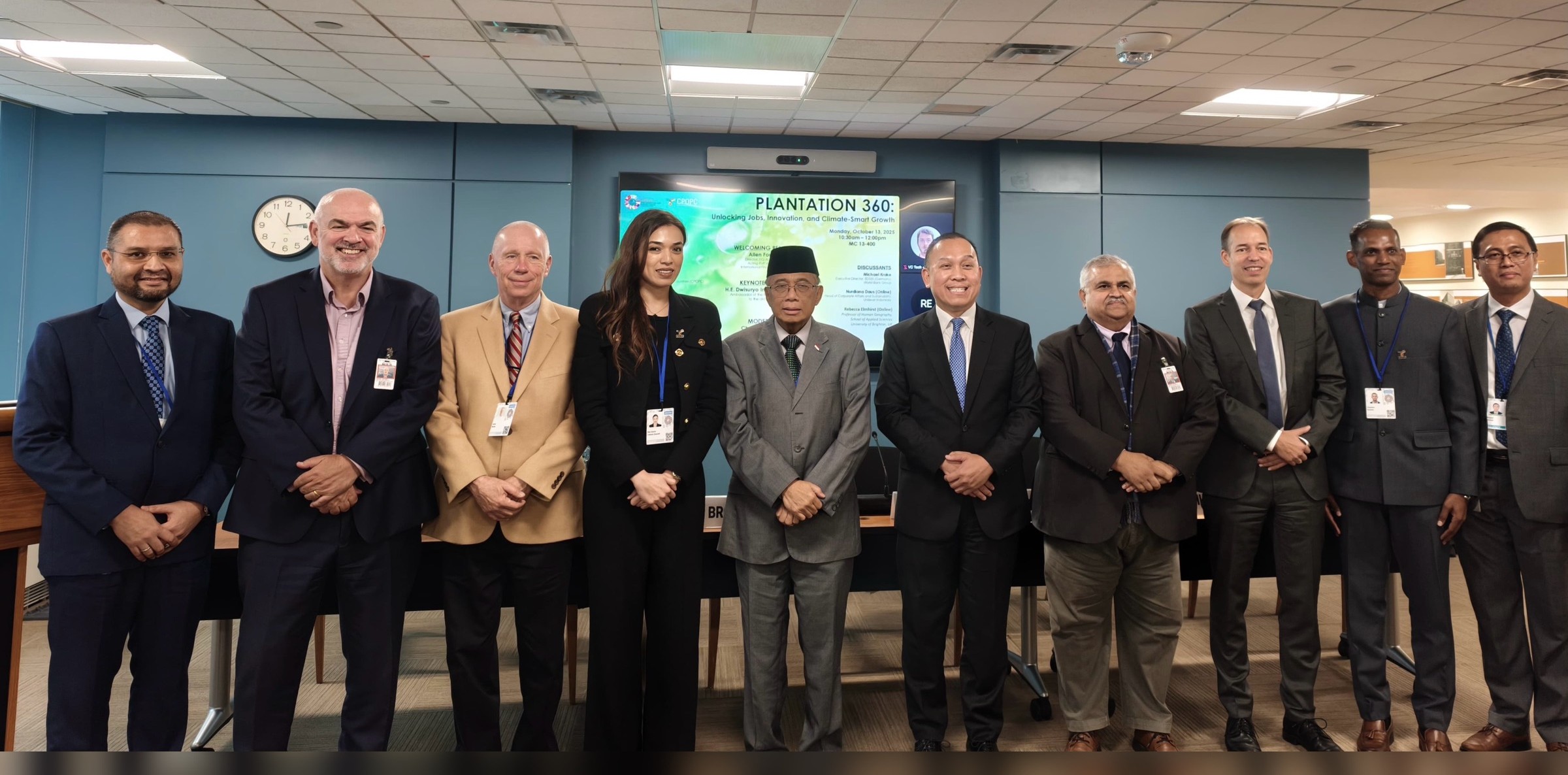18 October, 2025,

The World Bank Group and CPOPC Collaborate to Highlight Palm Oil,s Global Significance in Jobs, Innovation, and Climate Initiatives

PRESS RELEASE OFFICE OF THE EXECUTIVE DIRECTOR FOR THE SOUTH-EAST ASIA VOTING GROUP, WORLD BANK GROUP
&
COUNCIL OF PALM OIL PRODUCING COUNTRIES (CPOPC)
The World Bank Group and CPOPC Collaborate to Highlight Palm Oil's Global Significance in Jobs, Innovation, and Climate Initiatives
Washington, D.C., October 14, 2025 — Palm oil took the global stage this week as the World Bank Group and Council of Palm Oil Producing Countries (CPOPC) collaboratively organized a side-event seminar at the 2025 World Bank–IMF Annual Meetings to champion the crop’s untapped potential to fuel jobs, innovation, and climate-smart growth worldwide. This is the first-of-its-kind seminar held at the World Bank that focuses on palm oil.
At the seminar titled “Plantation 360: Unlocking Jobs, Innovation, and Climate-Smart Growth,” speakers discussed palm oil’s role in providing employment for more than 24 million people worldwide and its contributions to rural economies and industrial development. Participants included smallholders, women entrepreneurs, engineers, and biotechnology specialists, representing various aspects of green job creation and digital advancement in the Global South. The seminar was led by Dr. Wempi Saputra, Executive Director for the South-East Asia Voting Group at the World Bank Group. Opening remarks were delivered by Allen Forlemu, Director - Regional Industry FIG Asia & Pacific and Acting Regional Vice President, International Finance Corporation, followed by a keynote address from H.E. Dwisuryo Indroyono Soesilo, Ambassador of the Republic of Indonesia to the United States. Notable speakers included Izzana Salleh, Secretary General of CPOPC; George Baxter from the University of California; Satya Tripathi of the Global Alliance for a Sustainable Planet; and James Brooks from Clemson University.
CPOPC highlighted how palm oil is evolving beyond its traditional image, emerging as a platform for innovation, circular economy solutions, and climate resilience. With the World Bank now channeling US$3 billion annually into climate-smart agriculture, both institutions are aligning forces to position palm oil as a strategic partner in the global green transition.
Palm oil remains a cornerstone of global food security and sustainable development. Supplying affordable and nutritious fats to billions, it delivers the highest yield per hectare among vegetable oils, making it essential to meet future demand. With its balanced composition and natural antioxidants, palm oil supports both health and food innovation. Official Use Only Beyond its nutritional value, the industry is advancing climate-smart and circular practices, reinforcing its role in driving inclusive growth, job creation, and environmental sustainability across producing countries.
“Palm oil is not just an agricultural commodity, it is a catalyst for inclusive, technologydriven, and sustainable growth,” the forum emphasized. Through smarter policies, digital traceability, and investment in green technologies, palm oil is transforming into a model for sustainable development that balances people, planet, and prosperity. In his welcoming remarks, Allen underscored the momentous role played by palm oil industry in job creation, sustainability, innovation and inclusive development. He also acknowledged the economic importance of palm sector and the transformative effects.
The event marked a breakthrough moment for global recognition of palm oil’s evolving story from controversy to climate solution. As the world races to meet its sustainability goals, the World Bank and CPOPC are showing that collaboration, innovation, and inclusion are the real growth drivers of tomorrow.
Michael Krake, Executive Director for Germany of the World Bank Group recognized CPOPC for the effort and the courage to bring along various stakeholders and address the issues around the sector with the support of World Bank. He emphasized the importance of continuously engaging stakeholders at different levels to address the misunderstandings and misconceptions regarding palm oil. Additionally, Nurdiana Darus of Unilever Indonesia and Rebecca Elmhirst of University of Glasgow highlighted the role for jobs creations, sustainability practices of the sector. There was also a discussion stressing the importance of sustainability practices and the role of the palm oil sector for future jobs creation, particularly for the youth.
The event brought together professionals from multilateral institutions, industry, and academia to exchange information and discuss possible solutions.
Source: CPOPC.netBACK TO NEWS
Copyright © 2024 cpopc.net. All Right Reserved.







